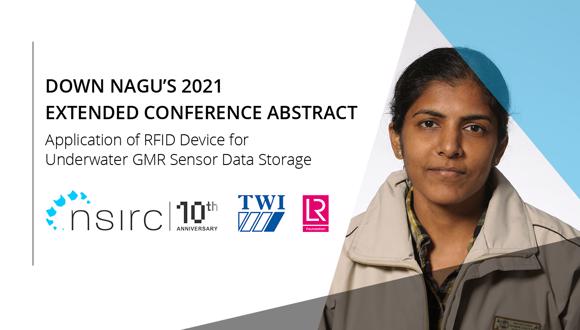Mon, 21 November, 2022
PhD student Nagu Sathappan, sponsored by Lloyd Register Foundation (LRF), has passed her PhD Viva voce (oral examination) with minor modifications.
Nagu’s PhD thesis investigates the use of Magnetic Flux Leakage (MFL) for testing on pipes in extreme underwater and high-temperature conditions. In particular, the detection and characterisation of MFL distribution caused by the loss of metal in ferromagnetic steel pipes.
Dr. Liam Penaluna, TWI Industrial Supervisor for Nagu's PhD said, “Corrosion represents a significant problem to many industries, and Nagu’s work focuses on detecting and monitoring it in some of the most difficult yet vital locations."
"Her research outputs have global impact on both safety and environmental protection. I am delighted that she has been granted her PhD in recognition for all her hard work.”
Development of an underwater and high-temperature sensor for a permanently installed corrosion monitoring system
Research topics at NSIRC are built during discussions with the industrial members of TWI, as well as the key sponsors of NSIRC (LRF and bp), to solve urgent needs for new technology and innovation.
What industry needed was a new application of remotely operated vehicles, and autonomous underwater vehicles, with data communication in pipes, and the upgrading of sensors for monitoring pipelines within high-temperature conditions.
The results of Nagu's successful study will be used to develop a magnetic circuit that works efficiently under extreme conditions. In doing so, it will reduce the need for human inspection, and away from a hazardous environment.
The topic will also assist in maintaining the structural integrity of long pipelines, so that they do not compromise environmental safety, as well as the personnel involved. These is key priority of LRF, to make the world a safer place to work and live.
Download Nagu's extended abstract from the NSIRC Research & Innovation Conference 2021
Nagu Sathappan - Abstract - NSIRC Research & Innovation Conference 2021 - pdf - 323kb
 Photo: TWI Ltd
Photo: TWI Ltd
Nagu Sathappan: Achievements across academia and industry
During her PhD, Nagu has presented her research at six conferences and published papers in two peer-reviewed journals, including the MDPI journal ‘Sensors’ and ‘Marine Technology Society Journal.’
In addition to this, Nagu has published three full conference papers in NDE India 2020, Prognostics and Health Management Conference (PHM) 2022, and Robotics in Natural Settings, at CLAWAR 2022.
Speaking about her PhD opportunities, Nagu said, “My journey has been exceptional experience, with TWI and NSIRC providing the tools and network for me to thrive in my subject area.”
She added, “NSIRC has supported me throughout my doctoral studies, starting from the workspace provided at TWI, and support during the pandemic. I am thankful to God and my parents, as well as my supervisors starting with Liam Penaluna, John Rudlin, Prof Mohammed Osman Tokhi, Gholamhossein Shirkoohi, Fang Duan, and Zhanfang Zhao, all of whom were with me from the start to the end of my PhD.”
Nagu's degree was awarded by London South Bank University.
What is a PhD Viva?
An oral examination process, sometimes refereed to as a doctoral defence, where external examiners discuss with a PhD candidate their thesis and research in order to justify the merit of whether the doctoral degree can be awarded.
It is important that before their Viva, that PhD candidates re-read their thesis so that it is fresh in their minds. And they should ask their supervisors to conduct a mock viva for practice. This can help predict what questions that the real external examiners are mostly likely to ask, and if any, or which minor corrections might need to be made.
To find out more, visit our longer read article 'PhD Viva Meaning'.